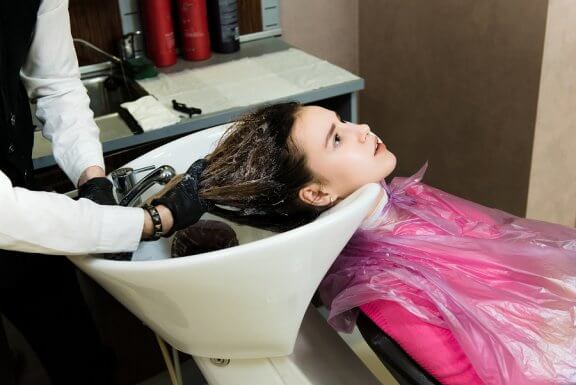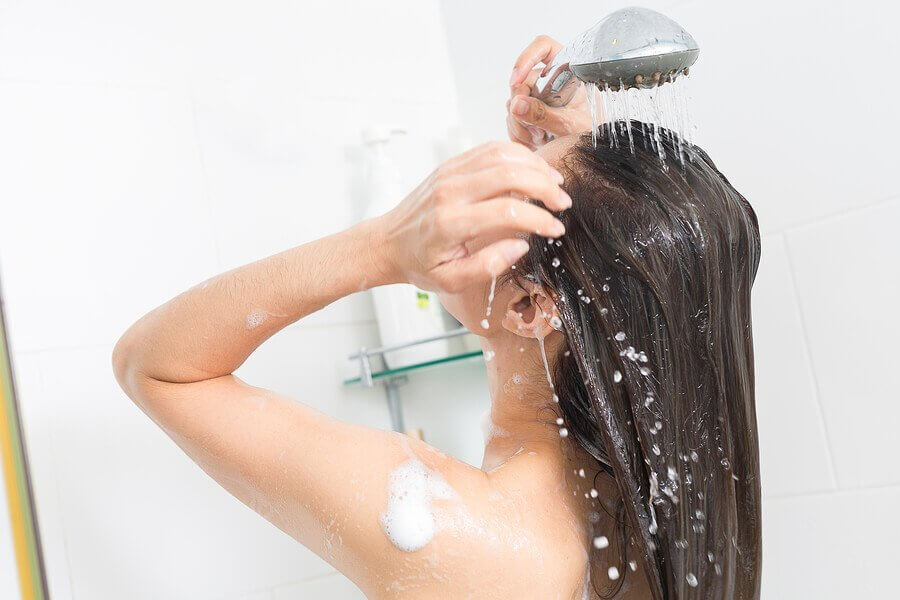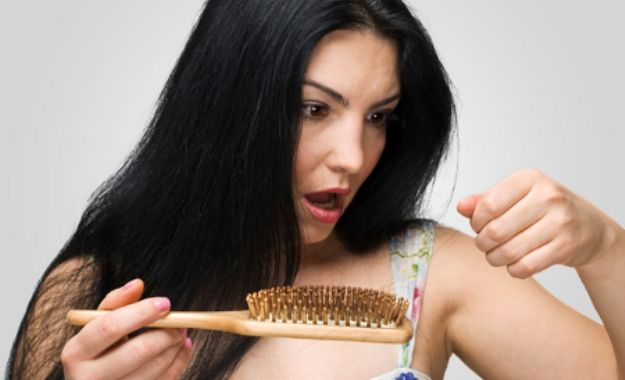Can Women Permanently Straighten Their Hair During Pregnancy?

Many expecting mothers wonder if it’s possible to permanently straighten their hair during pregnancy. It’s not a good idea, especially during the first three months of pregnancy, when you need to be very careful for your baby’s sake.
Permanent hair straightening can be very toxic due to the high levels of formaldehyde. Therefore, you need to pay close attention because this can harm your baby’s development.
There are almost always negative effects of nourishing hair treatments, and there are even more when you’re pregnant. Keratin procedures hydrate and nourish deeply, but sometimes it’s not good to continue with them.
If the keratin doesn’t contain any harmful chemicals, you can continue using it. However, you have to be absolutely sure. It’s actually very common to see formaldehyde in common bathroom products.
Formalin is a cancer-causing chemical banned for expecting mothers. Most hair straightening and nourishing treatments contain it. Therefore, it’s essential to make sure that your hairdresser doesn’t use any products with this harmful ingredient.
Although it’s necessary to ask your OB/GYN, we don’t recommend that women permanently straighten their hair during pregnancy, especially in the first trimester. It’s best to avoid any procedure that isn’t completely necessary.
Can women permanently straighten their hair during pregnancy?
If you want to do a Japanese straightening treatment, keep in mind that this process contains chemicals derived from ammonia. As for permanent treatments, we also advise against these. The liquids used in it are harmful to the fetus.
Regarding permanent straightening, the same thing happens. You should avoid this because most of the products contain formaldehyde, a substance that’s harmful to your baby’s development and your health.
It’s a very toxic product, capable of irritating and damaging your respiratory system, eyes, and overall wellbeing.

In short, it’s best that women don’t permanently straighten their hair during pregnancy. It’s also good to avoid smoothing treatments or dyes. You can opt for other alternatives, such as using natural pigments or plant-based products. These don’t contain toxic chemicals.
Beware of dyes
OB/GYNs recommend that their patients don’t use normal dyes. It shouldn’t cover the head completely or reach the scalp. This is because the dyes include some chemical components, such as aniline, which can affect your baby’s development.
This chemical, if ingested, inhaled or comes in contact with your skin, damages your hemoglobin. This is what’s responsible for transporting oxygen to your blood
In addition, some women develop allergies to certain chemicals during pregnancy. In that case, you need to pay attention and consult with your doctor and hairdresser.
“We don’t recommend permanent straightening treatments, especially in the first trimester of pregnancy. It’s best to avoid any procedure that isn’t completely necessary.”
The care your hair needs during pregnancy
It’s important to know that, during pregnancy and breastfeeding, your hair grows more than normal. This happens because estrogen and progesterone stimulate hair growth during pregnancy.
Once your body returns to normal levels, your hair takes the rest it needs. This stage usually ends 12 weeks after delivery or after breastfeeding. Excess hair falls out, and your hair goes back to its original appearance. Therefore, it goes back to the volume and thickness it had before.
That being said, it’s necessary that you provide your hair with basic care before, during and after pregnancy. Don’t forget to wash it with shampoo and condition it after.

If you have dry hair, use a moisturizing mask once a week. You can also stimulate capillary circulation with a massage. If you notice loss of volume after delivery, you can use specific products to give your hair more body.
After giving birth, you’ll notice new things that affect your body. Nervousness and stress facilitate hair loss. However, don’t worry about this because it’s a short phase. The same happens during breastfeeding. This is because of your body adapting to your new role as a mother.
If you decide to use a treatment to prevent hair loss, you should consult your doctor beforehand. They may contain substances that harm your baby. The best thing you can do is stop using any hair treatment during pregnancy or until you’re done breastfeeding.
All cited sources were thoroughly reviewed by our team to ensure their quality, reliability, currency, and validity. The bibliography of this article was considered reliable and of academic or scientific accuracy.
- Amiri A., Pryor E., Rice M., Downs C., Turner A., & Fanucchi M. (2015). Formaldehyde exposure during pregnancy. MCN. The American Journal of Maternal Child Nursing, 40(3), 180–185. Recuperado de: https://pubmed.ncbi.nlm.nih.gov/25919211/
- Caro R., & Fast J. (2020). Pregnancy myths and practical tips. American Family Physician, 102(7), 420–426. Recuperado de: https://pubmed.ncbi.nlm.nih.gov/32996758/
- Couto A., Ferreira J., Rosa C., Pombo-de-Oliveira M., Koifman S., & Brazilian Collaborative Study Group of Infant Acute Leukemia. (2013). Pregnancy, maternal exposure to hair dyes and hair straightening cosmetics, and early age leukemia. Chemico-Biological Interactions, 205(1), 46–52. Recuperado de: https://pubmed.ncbi.nlm.nih.gov/23747844/
- Fox N. (2018). Qué hacer y qué no hacer durante el embarazo: Verdades y mitos. Maternal-Fetal Medicine Associates, 131:713–21. Recuperado de: https://journals.lww.com/greenjournal/Documents/Apr2018_Translation_Fox.pdf
- Guerrero A., Medina K., Kahn M., & Guerrero M. (2009). Utilidad y seguridad del 17-alfa-estradiol 0, 025 por ciento versus minoxidil 2 por ciento en el tratamiento de la alopecia androgenética. Rev. chil. dermatol, 21–25. Recuperado de: https://pesquisa.bvsalud.org/portal/resource/pt/lil-525459
- Matos, T. (2015). Cuidados del Embarazo: Maternidad y Salud. Maternidad y Salud. Recuperado de: https://books.google.es/books?id=oPa1BgAAQBAJ&dq=Se+cae+el+exceso+de+cabello+y+el+pelo+recupera+su+aspecto+original+embarazo&lr=&hl=es&source=gbs_navlinks_s